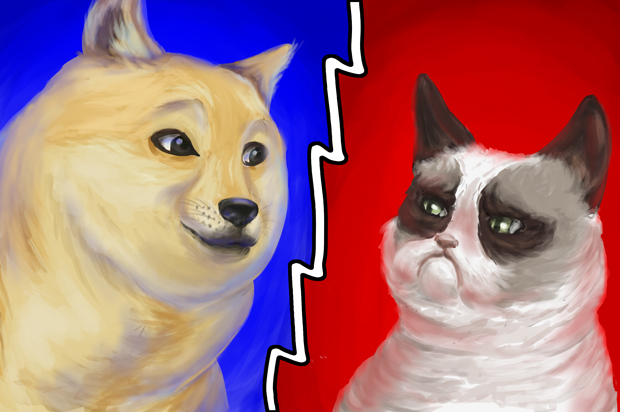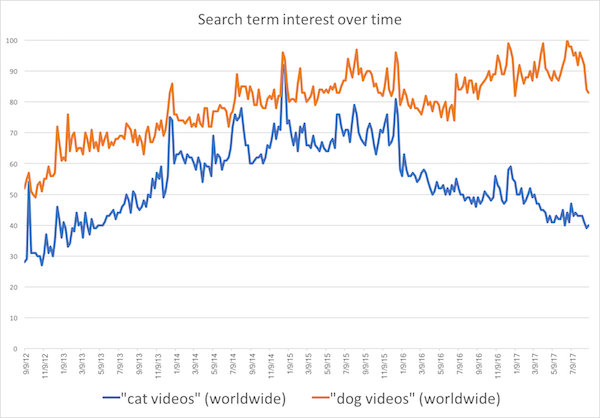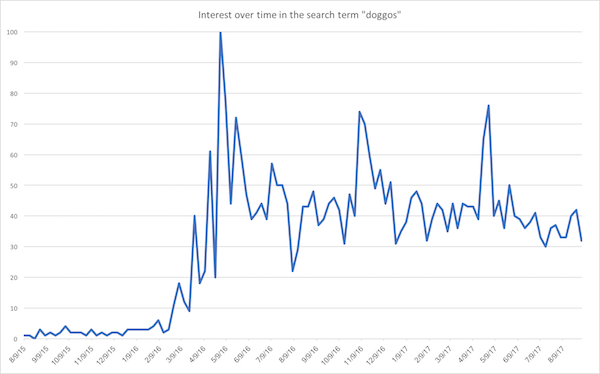Paw through the pundit-verse, and you’ll find that it is a truth universally acknowledged that cats rule the internet. “The internet is one giant, virtual cat park,” wrote Jack Shepherd in the Guardian in 2014. “These are indisputable facts.” The Museum of the Moving Image in New York City recently had a “How Cats Took Over the Internet” exhibit, featuring cat videos and cat memes galore. “The museum exhibit argues that cats are basically the mascots of the internet,” wrote Bryan Lufkin in Gizmodo, noting that Wired, Buzzfeed and Mashable have all written takes affirming the same dictum.
But in the past year and a half, something very strange has happened: The internet has gone to the dogs. I polled my coworkers and friends on this, and all agreed — their social media feeds were stuffed with far more dog memes than cat memes, as evinced by Twitter accounts like WeRateDogs (soon to be a book), the rise of “doggo” slang, and the preponderance of dog memes like shibe and dogspotting.
This is Apollo. He knows he's h*ckin handsome. Stud status achieved. 12/10 would wink back pic.twitter.com/QbEb0I1J9z
— WeRateDogs (@dog_rates) September 7, 2017
Digging deeper into this, I found the increased popularity of dogs wasn’t just anecdotal. It’s borne out by internet search data. Google, the most popular search engine, has an analytics tool called Google Trends that allows you to parse through search data to compare what terms are more popular over time. The tool is revealing but not conclusive, mainly because search terms don’t necessarily indicate interest; after all, a search for “traffic jam” doesn’t indicate that the searchee likes being trapped bumper-to-bumper. Yet Google Trends does do a good job illustrating baseline of interest, then illustrating change over time in search result popularity — that is to say, the d/dt of search traffic, for us calculus-knowers.
Sifting through Google Trends data on the search volume of “cat videos” versus “dog videos,” you’ll notice that the trend lines mirror each other pretty evenly. For the past five years at least, there was a big spike in both searches around Christmas, which I guess says something about how people weather family time. Yet something interesting happened after December 2015: searches for “cat videos” began to consistently decline, while “dog videos” rose. In other words, the two began to diverge just as we were ringing in 2016.
Then, right around March 2016, interest spiked in the search term “doggos” — that is, the current cutesy internet slang name for cute dogs, analogous to “kittehz” in the days when cat slang reigned supreme. “Doggo” searches peaked in May 2016, and have been pretty consistent since June 2016.
I’m not the only one to have noticed this. The Daily Dot pointed out the surprising longevity of the “doge” meme, still popular even three years after it began — peculiarly long for memes, which tend to last a few months before fading.
Likewise, a year ago, in September 2016 — when, perhaps, the trend toward canines was just starting to become visible — Elana Cresci wrote an article in the Guardian speculating that cats seemed poised to be dethroned — declawed? — from their perch atop the digital animal kingdom. Cresci points to the smartphone camera as partly responsible: Cats’ personalities were better-suited to still images, whereas dogs are best captured in motion. This seems to make sense; the “lolcats” of the “I can has cheezburger” memes (if that phrase made no sense to you, click the links) peaked around 2008, before smartphones were ubiquitous. Lolcats were confined in still images, punctuated with droll phrases written in Impact at the top and bottom of their respective image macros.

But filming one’s dog doing cute things just wasn’t as easy in 2008 as it is now. Maybe Web 2.0’s much-maligned “pivot to video” is also a pivot to canidae.
And yet, I don’t think smartphone cameras can fully explain the rise of the planet of the dogs. There’s something too peculiar about the timing. Note that doggos skyrocketed in search volume popularity around March 2016, and dog videos and cat videos diverged in search volume in December 2015. What happened around that time?
That’s right. I’m talking about the big orange tabby — er, politician — in the room. The timing is too rich; just as a certain aloof, ill-tempered, self-centered politician rose to power, the internet became less interested in a certain aloof, ill-tempered, self-centered pet.
Of course, correlation does not mean causation, and English-language search traffic does not constitute the whole United States and its cultural anxieties. Still, something about this is telling. In a political era defined by xenophobia and isolationism, with growing nationalist movements around the globe, the animal that typifies sass and self-interest is becoming less compelling — while the animal that symbolizes unconditional love is becoming more compelling.
I brought this up with a psychology professor friend of mine, who suggested that the reason could be broader — and have to do with anxiety. “There’s a lot of anxiety growing in the population,” he told me. “One can see it — I talk to therapists and they say, ‘oh my god, it’s rampant.'” There are statistics on what is sometimes called “Trump anxiety“; Psychology Today reported on a recent study that found that 59% of Americans are “anxious because of the November election results,” 50% are “looking for ways to cope with the negative environment,” and 26% are “engaging in negative behavior such as drinking or smoking more often, eating unhealthily, or arguing with loved ones more frequently as a result of their election-induced anxiety.”
“In general when you’re anxious you’d tend to seek animals that are soothing — they love you unconditionally, and it does seem as though dogs fit that bill better than cats,” my psychologist friend added.
So, there’s one hypothesis: It could be that dogs are just a salve for the anxiety-ridden times that we live in, an antidote to the Trump/Brexit era of hate, racism and xenophobia. Trump and the alt-right may be seething with hate, but dogs love unconditionally. As much as we love cats for their sassiness and poise, they just can’t comfort us like man’s best friend.



